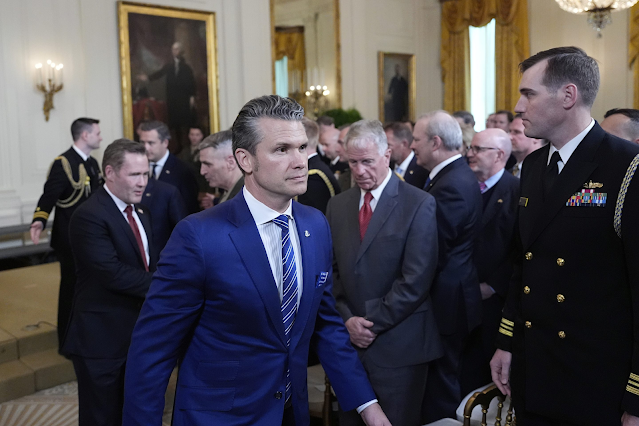Monday, April 21, 2025 - U.S. Defence Secretary, Pete Hegseth shared detailed military plans regarding operations against the Houthis in Yemen in a private Signal chat that included his wife, brother, and lawyer - three people familiar with the chat tell CNN.
The chat, conducted on Hegseth’s personal phone, was
originally set up during his contentious confirmation process to coordinate
with close allies, but it remained active after his confirmation. The group
included over a dozen individuals, some of whom did not hold security
clearances, including his wife, Jennifer, who has also attended foreign leader
meetings despite holding no official position.
The revelation has deepened concerns about Hegseth’s
judgment amid a period of significant upheaval at the Pentagon. His former
press secretary, John Ullyot, along with three recently fired senior
officials—top adviser Dan Caldwell, deputy chief of staff Darin Selnick, and
Colin Carroll, chief of staff to the deputy secretary of defence—have all
raised alarms about the secretary’s leadership.
“It’s been a month of total chaos at the Pentagon,” Ullyot
said in a statement. “From leaks of sensitive operational plans to mass
firings, the dysfunction is a major distraction for the president, who deserves
better from his senior leadership.”
The second Signal chat is separate from another group
Hegseth used to communicate with Cabinet officials about military
planning—currently under investigation by the Department of Defense Inspector
General. Like the first, the second chat reportedly included sensitive
information about planned military strikes against the Houthis.
While a Pentagon spokesperson claimed no classified
information was shared, concerns remain about the involvement of non-cleared
individuals, including Hegseth’s wife.
The disclosures follow a turbulent
period marked by multiple firings, staff reshuffling, and a wave of internal
investigations. Hegseth fired Caldwell, Selnick, and Carroll last week and
reassigned chief of staff Joe Kasper, who later resigned. Sources suggest the
firings stem from escalating tensions and infighting within Hegseth’s office
rather than the alleged leaks.
Concerns over information security escalated in March after a series of media reports about military plans for the Panama Canal and the Middle East, as well as a classified China briefing involving Elon Musk. Hegseth, rattled by the leaks, reportedly launched an internal probe with polygraph testing.
Despite Hegseth’s suspicion of leaks, Ullyot and the dismissed aides deny any wrongdoing. In a joint statement, they expressed disappointment at their abrupt termination, saying they “served the country honourably” and emphasised their commitment to information security.
“At
this time, we still have not been told what exactly we were investigated for,
if there is still an active investigation, or if there was even a real
investigation of ‘leaks’ to begin with,” they stated
Ullyot further disputed the Pentagon’s
justification for the firings, saying no polygraph tests were conducted, and at
least one of the dismissed aides had been on the verge of being cleared by
investigators.
The internal chaos comes at a critical
time, as the Pentagon manages a large-scale military campaign in the Middle
East, addresses tensions between Israel and Iran, and deploys troops and assets
to the U.S. southern border.
"Even strong backers of the
secretary like me must admit: The last month has been a full-blown meltdown at
the Pentagon—and it's becoming a real problem for the administration,"
Ullyot said.








0 Comments